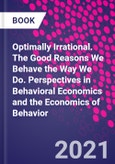Optimally Irrational: The Good Reasons We Behave the Way We Do provides economists, social scientists and researchers in behavioral economics with a clear view of the frontier of research in economics and other behavioral sciences, including how the different biases unveiled by behavioral economics make sense when we try to optimize problems. The book evaluates the role of bias in human economic behavior, considers the human decision-making processes as the product of natural selection, and explores why we behave the way we do.
Table of Contents
I Setting the scene 1. The homo economicus model 2. The psychology of biases in human behaviour 3. The logic of a scientific revolution in economics 4. Evolution and the logic of optimisation
II Individual decisions 5. Heuristics and biases 6. Reference dependent preferences 7. Sensitivity to probability 8. Random utility 9. Time preferences
III Strategic interactions 10. Kindness and reciprocity 11. Emotions and commitment 12. Trust and reputation 13. Selection of delusion








